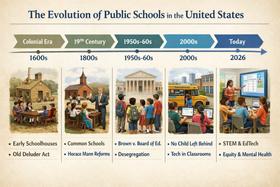Colorado School District Facing Outrage Over Voucher Program
School choice has been an ongoing debate in districts nationwide, but one Colorado district has been getting plenty of attention on this subject lately. Douglas County, located in the southern part of the Denver metro area, has unanimously approved a voucher program that provides state funding to parents who want to enroll their children in private schools. The Douglas County school board approved the measure in March of this year, but the fight is just beginning over the constitutionality of such a move. We’ll look at both sides of this potentially explosive issue to determine whether using taxpayer dollars to fund private schooling should be allowed under the law.
The History of the Voucher Program
The “Choice Scholarship” pilot program, due to launch in Douglas County during the 2011-2012 school year, was the brainchild of Milton and Rose Friedman. These two economists established the Milton and Rose D. Friedman Foundation in 1996 to advance an education system based on free choice. This couple firmly believes that the most effective way to raise the bar on the quality of education in this country is to provide free choice to parents and students that promotes healthy competition within the educational framework.
The Friedmans state on their website, “This foundation is the culmination of what has been one of our main interests for more than four decades: improvement in the quality of education available to children of all income and social classes in this nation, whether that education is provided in government or private schools or at home.”
Since its inception, the foundation's name has changed to The Foundation for Educational Choice. Still, the purpose remains the same – to ensure every child has access to a high-quality education, whether through public schools, private institutions, or instruction at home.
School vouchers are a controversial issue. In this video, NPR Ed correspondent Cory Turner offers a primer on how private school vouchers work and the arguments for and against them.
How the Voucher System Works
The Choice Scholarship pilot program will provide Douglas County students with vouchers that total the full cost of tuition for a private program or 75 percent of the per-pupil public revenue for the county (which currently equals $4,575), whichever is less. Parents can use these vouchers to pay for private schools of their choice, adding to the amount when necessary to make up the full cost of the tuition at the institution of their choice. To be eligible for a voucher, students must be enrolled in a Douglas County school for at least one year and attend a school within the county.
Currently, the program allows for 500 vouchers to be issued. If more than 500 students apply for the program, a lottery system will determine which families will receive the vouchers. Those who win a spot in the program will receive quarterly checks, which they can then sign over to the private school of their choice. Currently, the program has 31 private schools participating in the voucher option.
The Arguments in Favor
Those in favor of the Choice Scholarship pilot program attest that providing more educational choices to families is the only way to raise the bar on the quality standard within the education system. By allowing families to select the best school for their children, they ensure their students receive the best possible educational environment for their specific needs. The program also reduces disparities among students from low-income families since it provides them with the same opportunities to attend private schools as their wealthier peers already have.
This video shows Steve Jobs' view of education and the systems behind it. He was interviewed by the Computerworld Information Technology Awards Program in 1995 during his time at NeXT, Inc., just a year before being purchased by Apple. It was part of an oral history project conducted by Daniel Morrow, then executive director of the awards program.
The Question of Constitutionality
Despite the potential benefits a program like Choice Scholarship can offer, there are many questions about the constitutionality of such a system. These concerns have prompted numerous lawsuits against Douglas County, including one by the ACLU and another by the group Americans United for Separation of Church and State. More minor suits have also been filed by parent groups and other concerned citizens who believe this voucher system is a gross violation of the separation of church and state, as well as a misuse of taxpayer dollars.
Gregory M. Lipper, litigation counsel for Americans United for Separation of Church and State, told Education News Colorado, “What we are arguing is that the Colorado constitution and the Colorado statutes are very clear that taxpayer money can’t be used to fund religious schools or religious education.” Since many of the private schools in Douglas County are faith-based, Lipper argues that this violates Colorado law.
Mark Silverstein, the legal director of the ACLU Colorado, agrees with Lipper. Silverstein told KDVR, “They have the right to send their children to religious private schools. The issue is they cannot do so with taxpayer money.”
One of the lawsuits filed against the county comes from a smaller group known as Taxpayers for Public Education. This collection of primarily concerned parents has stated in their case that the voucher program violates both the state constitution and the Public School Finance Act. Anne Kleinkopf, one of the organization's directors, summed their cause up simply to the Denver Post by saying, “You have to use tax dollars for public schools. You can’t use tax dollars for private schools.” Kleinkopf added that her children graduated from Douglas County schools, which she called “excellent.”
“Douglas County is taking money out of everyone else’s pocket to fund this program,” Kleinkopf concluded.
In this video, economist Milton Friedman explains his views on vouchers.
A lottery had to be instituted for the first round of vouchers because more than 500 students applied for the available spots. However, the multitude of court cases in the works guarantees that this debate over public vs. private education is far from over in Douglas County this year.
Questions? Contact us on Facebook and Instagram. @publicschoolreview
#SchoolVouchers #EducationChoice #PublicFunding #ConstitutionalDebate #DouglasCounty














